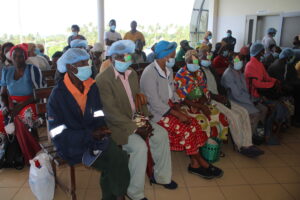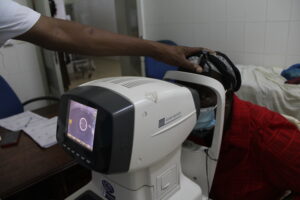Blindness caused by cataracts is not sufficiently controlled in Inhambane province, the number of accumulated cases is very high, and surgical coverage is very low. The highest prevalence of blindness affects women: 7% of women over 50 suffer from it, compared to 5.3% of men.

Suppose we add to this problem that the economic and social limitations of the elderly make it difficult for them to access the Provincial Hospital of Inhambane. In that case, the only one in the province with the capacity to perform eye surgeries, the need arises to increase actions that allow surgical care to be brought closer to areas that do not have it. For this reason, the Eyes of the world team regularly travels to carry out massive cataract intervention campaigns:
- From February 26 to March 4, at the Quissico Hospital in the Zavala district, 88 patients (49 men and 39 women) underwent surgery.
- From March 14 to 18, at the Vilankulo Rural Hospital, 85 people (47 men and 38 women) were operated on.
In both campaigns, the evaluation of surgical quality was carried out through the Boost Cataract application. This tool is being implemented in the Eyes of the world ophthalmological cooperation project in Inhambane. First, preoperative data was collected; the day after the operation, data on the postoperative visual acuity of the patients were collected, and after six weeks, the visual acuity data was collected again, and the fundus of the operated eye was explored to obtain the results of the follow-up process of the surgical quality.

The objective is to optimize the quality of the results in cataract interventions and advance in the fight to eradicate avoidable blindness since the loss of vision caused by cataracts involves multiple complications that lead to psychological, social, economic, and problems which face the quality of life.
These surgery campaigns are funded by the Government of Navarre and ESCRS (European Society of Cataract and Refractive Surgeons).